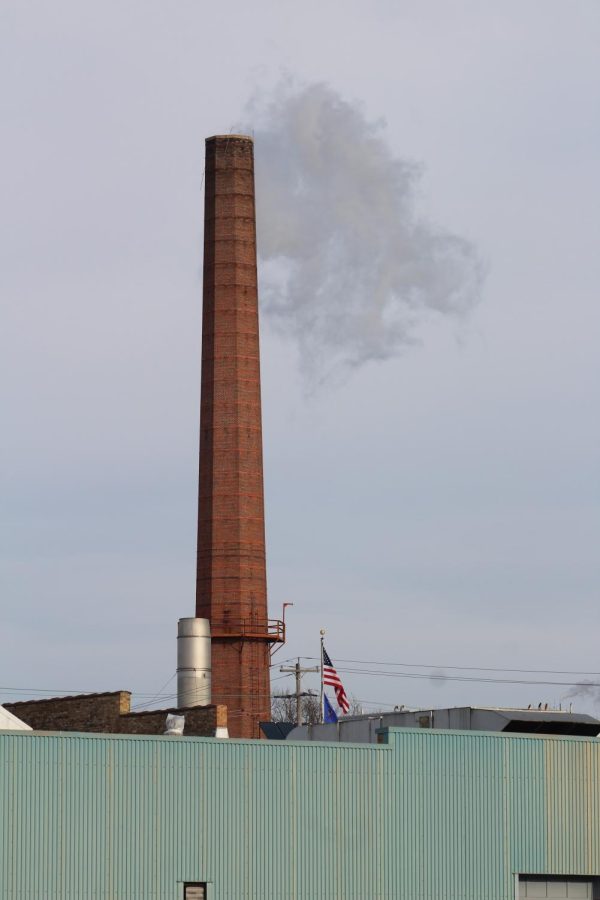‘The weather outside is frightful, but the [heat] is so delightful’
Campus heating gets turned on after first snowfall of the season
Katie Pulvermacher / The Advance-Titan– Campus heating gets turned on after first snowfall of the season. The Central Heating and Chilling Plants are located on the north side of campus and easily distinguishable.
October 19, 2022
UW Oshkosh campus heating was not turned on until Oct. 17, which left some students, faculty and staff complaining about the cold temperatures they had to deal with.
“It’s been freezing in my dorm,” third-year Sammy Wanke said. “It’s been so hard to get out of bed in the morning because it’s so cold.”
Temperatures dipped down into the 30s in the past couple weeks, leading to difficult mornings and wearing lots of layers.
“This is a process we must go through every fall and spring,” Chief Facilities Officer JoAnn Rife said. “It is not an exact science, but we do our best to determine when to make the change.”
According to Campus Sustainability Coordinator Brad Spanbauer, in the central heating plant workers fire up massive boilers. The boilers heat up water and that water creates steam which runs through pipes and is pressurized and creates heat for campus.
“[The heating plant] is how our entire campus, 54 buildings, are heated and cooled throughout the year,” Spanbauer said. “Our chiller plant is the largest user of electricity on campus by far. All of this infrastructure is underground, under our feet, running in these massive steam tunnels and piping systems.”
Rife said campus heating is usually turned on in mid-October due to the weather being consistently cooler and therefore cooling down the buildings.
“Each fall, facilities staff considers forecasted weather conditions to determine when to turn on the heat for the season,” Rife said. “Because most of our buildings are connected to the steam loop from the main heating plant, once the heat is turned on, it is on until we turn off the heat in spring.”
Spanbauer said UWO switched from using coal to 100% natural gas in the heating plant in 2020 after finishing a 50-year contract with a coal mine in Kentucky.
“The good thing about natural gas is that it burns cleaner than coal,” Spanbauer said. “It produces about 50% fewer emissions than coal, but it is still a fossil fuel. When you think about natural gas, the burning side of it is super clean, but the extraction side is very bad.”
UWO saves no money by turning on the heat so late.
“Generally, we need to go from cooling to heating so there is not a savings – unless Mother Nature allows us some longer stretches of moderate weather, but that doesn’t tend to be the case,” Rife said.
If anyone on campus has yet to feel a temperature change in buildings, this is due to the process of heating.
“Once we turn on the heat, it will take a few days to move through the underground piping and effectively heat the buildings,” Rife said. “This process must be done slowly to prevent ruptures in the piping that can occur from quick changes in temperature and pressure.”
Various buildings on campus are sustainable in ways they can produce their own heating and cooling.
“Some buildings have solar thermal panels that help to heat the hot water, like Albee [Hall] or the pool,” Rife said. “Some buildings have solar electric panels to help reduce electrical energy we need from the local grid, like Sage [Hall]. Then we have Horizon Village and Student Success Center that utilize geothermal to help to heat and cool those facilities.”
Spanbauer said the green roof of Sage contributes significantly to the building’s own heating and cooling.
“The plants are going dormant [during colder months],” Spanbauer said. “Because we have an extra soil layer, that adds another layer of insulation and helps keep the heat better trapped in that part of the building.”
According to the Wisconsin State Legislature, “Heating pipes in unheated spaces shall be insulated with material providing a minimum thermal resistance of R-4 as measured on a flat surface in accordance with ASTM standard C 335 at a mean temperature of 75°F.”
Rife said buildings are set to the temperatures established by the State of Wisconsin at 72 degrees plus or minus two degrees.
Spanbauer said there are four student groups in an environmental studies senior seminar class helping investigate new renewable energy options to switch the campus heating plant.
“The main goal with climate action or decarbonization is we need to switch to electricity,” Spanbauer said. “We can get electricity through things like solar panels. We can harvest energy from a renewable source.”
To learn more about campus sustainability, visit uwosh.edu/sirt/.














